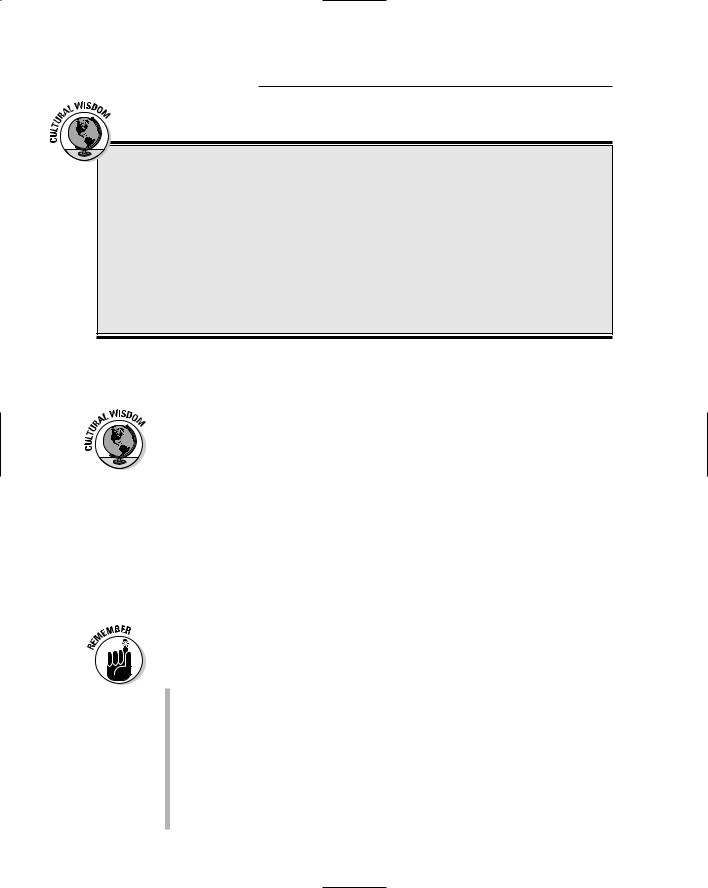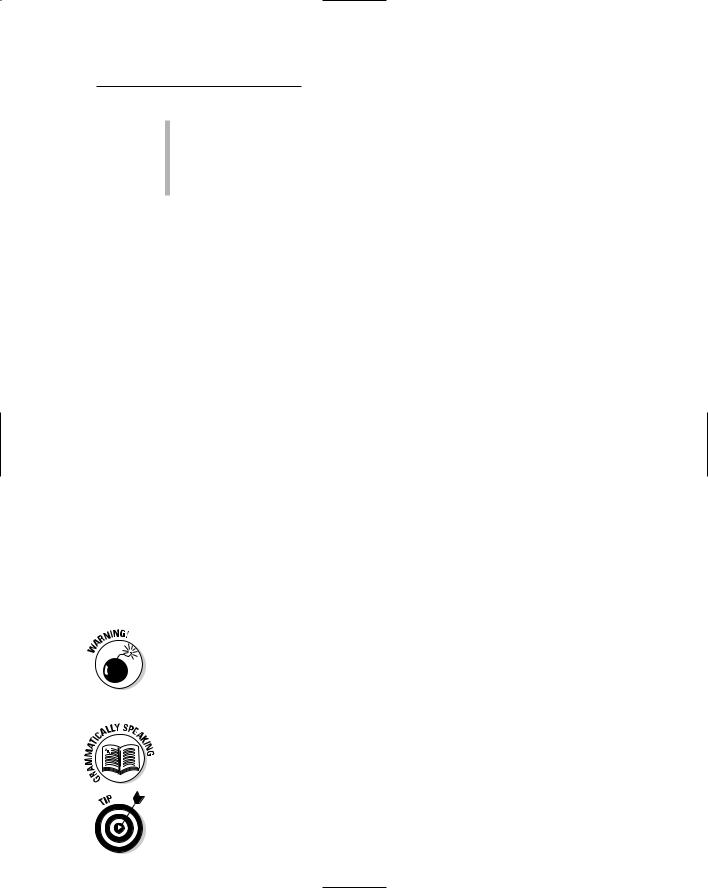
Russian For Dummies
.pdf
134 Part II: Russian in Action
Table 6-2 |
Speaking in Superlatives |
|
|
|
Masculine |
Feminine |
Neuter |
Singular |
samyj (sah-mihy) |
samaya |
samoye |
|
|
(sah-muh-ye) |
(sah-muh-ye) |
Plural (all genders) |
samyye |
samyye |
samyye |
|
(sah-mih-ee) |
(sah-mih-ee) |
(sah-mih-ee) |
|
|
|
|
If one coat is lightest of all the coats you tried on, you may want to say Eta kurtka samaya lyogkaya. (eh-tuh koort-kuh sah-muh-ye lyohk-kuh-ye; This coat is the lightest.) If you’re particularly fond of one pair of earrings, you can say Eti syer’gi samyye krasivyye. (eh-tee syer’-gee sah-mih-ee krah-see-vih-ee; These earrings are the most beautiful ones.)
To communicate that something is the worst in its category, Russians today use the word samyj plokhoj (sah-mihy plah-khohy; worst, Literally: most bad) for masculine nouns, samaya plokhaya (sah-muh-ye plah-khah-ye) for feminine nouns, samoye plokhoye (sah-muh-ee plah-khoh-ee) for neuter nouns, and samyye plokhiye (sah-mih-ee plah-khee-ee) for plural nouns.
So if you particularly dislike one dress, you say Eto plat’ye samoye plokhoye. (eh-tuh plaht’-ee sah-muh-ee plah-khoh-ee; That dress is the worst, Literally: That dress is the most bad.).
You Gotta Pay to Play: Buying Items
After you decide on an item of clothing or any other piece of merchandise, you want to make sure the price is right. In the following sections, we show you how to ask how much something costs, how to indicate you’ll take it, and how to find out how you should pay for it.
How much does it cost?
To ask how much something costs, you use the phrase Skol’ko stoit . . . ? (skohl’-kuh stoh-eet; How much does . . . cost?) + the name of the item in the nominative case, if you’re buying one thing. If you’re buying more than one thing, you ask Skol’ko stoyat . . . ? (skohl’-kuh stoh-yet; How much do . . .
cost?) + the name of the items in the nominative plural. (For more on cases and forming the nominative plural of nouns, see Chapter 2.)

Chapter 6: Shopping Made Easy 135
If you want to know the price of an umbrella, you ask Skol’ko stoit etot zontik? (skohl’-kuh stoh-eet eh-tuht zohn-teek; How much is this umbrella?) If you want to buy several umbrellas, you ask Skol’ko stoyat eti zontiki? (skohl’-kuh stoh- yet eh-tee zohn-tee-kee; How much are these umbrellas?)
The item you’re considering buying may be too expensive for you, in which case you say Eto ochyen’ dorogo. (eh-tuh oh-cheen’ doh-ruh-guh; It’s very expensive.) If, on the other hand, you’re pleasantly surprised with the price, you may joyfully say Eto dyoshyevo! (eh-tuh dyo-shih-vuh; It’s cheap!)
I’ll take it!
The simplest way to express your intention to buy something is to say Ya voz’mu eto. (ya vahz’-moo eh-tuh; I’ll take it.) You can also use a form of the verb kupit’ (koo-peet’; to buy) and say Ya eto kuplyu (ya eh-tuh koo-plyu; I’ll buy it.)
Kupit’ is the perfective aspect of the verb and can only be used to express past or future action. (For more on aspects, see Chapter 2.) It also has an irregular conjugation pattern. See Table 6-3.
Table 6-3 |
Conjugation of Kupit’ |
|
Russian |
Pronunciation |
Translation |
ya kuplyu |
ya koo-plyu |
I’ll buy |
|
|
|
ty kupish’ |
tih koo-peesh |
You’ll buy (informal singular) |
|
|
|
on/ona/ono kupit |
ohn/ah-nah/ah-noh |
He/she/it will buy |
|
koo-peet |
|
|
|
|
my kupim |
mih koo-peem |
We’ll buy |
|
|
|
vy kupitye |
vih koo-pee-tee |
You’ll buy (formal singular |
|
|
and plural) |
|
|
|
oni kupyat |
ah-nee koo-pyet |
They’ll buy |
|
|
|
Say you’re planning on buying the umbrella you like. You have two ways to state this fact in Russian using a form of kupit’: Ya khochu kupit’ zontik. (ya khah-choo koo-peet’ zohn-teek; I want to buy an umbrella.) or Ya kuplyu zontik. (ya koop-lyu zohn-teek; I will buy an umbrella.)

136 Part II: Russian in Action
Where and how do I pay?
More often than not a Russian store has a kassa (kah-suh; cahier’s desk) with a kassir (kuh-seer; cashier). To pay for your item, you first need to take your money to the kassir and get a receipt, which you then take back to the salesperson you’ve already dealt with. It’s a bit of a pain, and that’s why it’s always a good idea to ask first where you’re supposed to pay: A gdye mozhno zaplatit’? (ah gdye mohzh-nuh zuh-pluh-teet’; And where can I pay?)
When you ask A gdye mozhno zaplatit’?, the response may be V kassye.
(f kah-see; At the cahier’s desk.) or Platitye v kassu. (pluh-tee-tee f kah-soo; Pay at the cashier’s desk.) If you hear one of these phrases, head for the cashier’s desk if it’s in view. If it’s not, you can ask A gdye kassa? (ah gdye kah-suh; And where is the cashier’s desk?) Hopefully they’ll show you where it is, and your shopping adventure will almost be over!
If you’re unsure whether the store accepts credit cards, you can ask Vy prinimayetye kryeditnyye kartochki? (vih pree-nee-mah-ee-tee kree-deet-nih-ee kahr-tuhch-kee; Do you accept credit cards?) The answer may be Da, prinimayem. (dah, pree-nee-mah-eem; Yes, we do.) or Nyet, nye prinimayem, tol’ko nalichnyye. (nyet nee pree-nee-mah-eem tohl’-kuh nah-leech-nih-ee; No, we don’t, only cash.) See Chapter 14 for more about handling money.
Normally it’s almost impossible to receive a refund in a Russian store. Our advice: Think twice before you buy anything in Russia. If you’re really lucky, you may try to get a refund by saying Ya khochu eto vyernut’. (ya khah-choo eh-tuh veer-noot’; I want to return this.) The most common response will probably be My nye prinimayem obratno. (mih nee pree-nee-mah-eem ahb-raht- nuh; We don’t take it back.) or My nye mozhyem vyernut’ vam dyen’gi. (mih nee moh-zheem veer-noot’ vahm dehn’-gee; We can’t do a refund, Literally: We can’t give you back your money.) Once in a blue moon a sympathetic salesperson may agree to exchange what you bought. In this case you’ll hear Yesli khotitye, my mozhyem obmyenyat’. (yes-lee khah-tee-tee mih moh-zheem ahb-mee-nyat’; If you want, we can exchange it.) If you hear this phrase, consider yourself one of the lucky few, and go for it!

Chapter 6: Shopping Made Easy 137
Talkin’ the Talk
Zina and Nina are best friends. They call each other every day. Today Zina bought a new dress and calls Nina to share this exciting news.
Nina: |
Allyo! |
|
uh-lyo! |
|
Hello! |
Zina: |
Nina, eto ya. |
|
nee-nuh, eh-tuh ya. |
|
Nina, it’s me. |
Nina: |
Zina! Privet! Kak dela? |
|
zee-nuh! pree-vyet! kahk dee-lah? |
|
Zina! Hi! How are you? |
Zina: |
Nina, ya segodnya kupila syebye plat’ye! |
|
nee-nuh, ya see-vohd-nye koo-pee-luh see-bye plaht’- |
|
ee! |
|
Nina, I bought myself a dress today! |
Nina: |
Gdye? |
|
gdye? |
|
Where? |
Zina: |
V magazinye na Sadovoj ulitsye. |
|
v muh-guh-zee-nee nuh suh-doh-vuhy oo-lee-tseh. |
|
At the store on Sadovaya street. |
Nina: |
A za skolyko ty kupila plat’ye? |
|
uh zah skohl’-kuh tih koo-pee-luh plaht’-ee? |
|
And how much did you buy the dress for? |
Zina: |
Dyoshyevo. Za sto pyat’dyesyat. |
|
dyo-sheh-vuh. zah stoh pee-dee-syat. |
|
Cheap. For one hundred fifty rubles. |
|
|

138 Part II: Russian in Action
Words to Know
Ya kupila syebye . . . |
ya koo-pee-luh |
I bought myself . . . |
|
see-bye |
|
Na . . . ulitsye |
nah oo-lee-tseh |
On . . . street |
Za skol’ko ty |
zah skohl’-kuh tih |
How much did you |
kupila plat’ye? |
ee-voh koo-pee-luh |
buy the dress for? |
Za sto |
zah stoh pee- |
For one hundred |
pyat’dyesyat. |
dee-syat |
fifty rubles. |
Something Special: Cool Things to Buy in Russia
The best souvenir to bring home from Russia is a palyekhskaya shkatulka (pah-leekh-skuh-ye shkah-tool-kuh; Palekh box): a black lacquered box made from papier-mâché and decorated with paintings based on traditional Russian fairy-tale plots. The authentic boxes are manufactured only in two little Russian cities, Palekh and Khokhloma, and they’re quite expensive.
Watch out for knock-offs. Don’t buy a palyekhskaya shkatulka from street vendors, who often ask the same high price for their fake versions. Ask your guide or a hotel employee where the best place to buy these boxes is.
Another cool suvyenir (soo-vee-neer; souvenir) to bring home is the famous Russian matryoshka (muh-tryosh-kuh) doll. It’s a wooden doll that, when opened at its rather wide waistline, contains at least three of its “children” hiding inside of each other, each one smaller than the next. Matryoshki (muh-tryosh-kee) come in different sizes, and the bigger the “mother,” the more daughters you’ll discover inside.
You may also want to bring home with you a famous Russian myekhovaya shapka (mee-khah-vah-ye shahp-kuh; fur hat) that Russians wear in the winter. You can buy them in either chyornyj (chyohr-nihy; black) or korichnyevyj (kah-reech-nee-vihy; brown), and the best place to buy them is in an

Chapter 6: Shopping Made Easy 139
univyermag (oo-nee-veer-mahk; department store) in the otdyel (aht-dyel; department) called golovnyye ubory (guh-lahv-nih-ee oo-boh-rih; hats), or in any standalone store with that same name.
If you’re into collecting cool memorabilia from the past, you’ll definitely want to buy some sovyetskiye voyennyye chasy (sah-vyet-skee-ee vah-yen-nih-ee chuh-sih; Soviet military watches). These watches, which are now considered collectors items, usually come with many different stylish designs. They’re sturdy and reliable, because they were manufactured in Soviet times specially for military personnel. You can usually buy them at any store called suvyeniry (soo-vee-nee-rih; souvenirs).

140 Part II: Russian in Action
 Fun & Games
Fun & Games
At which of these stores are you likely to find the following items? See Appendix C for the correct answers.
a. obuv’ b. kosmyetika c. fototovary d. muzhskaya odyezhda e. khozyajstvyennyj magazin f. kantsyelyarskiye tovary g. golovnyye ubory
1.facial cream
2.suit
3.boots
4.camera
5.hat
6.soap
7.stationery
Compare the following (the correct answers are in Appendix C), using the words:
a. bol’shye b. myen’shye c. dorozhye d. kholodnyeye e. tyazhyelyeye
For example:
Q.Moskva . . . chyem Pyetyerburg. (Moscow is . . . than St. Petersburg.)
A.Moskva bol’shye chyem Pyetyerburg.
1.Pyetyerburg . . . chyem Moskva. (St. Petersburg is . . . than Moscow.)
2.Zima v Moskvye . . . chyem v San-Frantsisko. (Winter in Moscow is . . . than in San Francisco.)
3.Myersyedyes . . . chyem Toyota. (Mercedes is . . . than Toyota.)
4.Sapogi . . . chyem tufli. (Boots are . . . than shoes.)

Chapter 7
Going Out on the Town,
Russian-Style
In This Chapter
Talking about the time
Planning to go out
Catching a flick
Getting the most out of the ballet and theater
Checking out a museum
Sharing your impressions about an event
This chapter is all about going out on the town the Russian way. We take you to the movies, the theater, the ballet, and a museum. These places are still
the most popular for Russians to go on their time off. We show you how to make plans with friends, how and where to buy tickets, how to find your seat, how to make the most of intermission, and what to say when you want to share your impressions of an event with your friends. But to make sure you’re not late, we first need to tell you how to ask about and understand show times. So please be patient, or as Russians like to say, Vsyo khorosho v svoyo vryemya (fsyo khuh-rah-shoh f svah-yo vrye-mye; Everything in good time).
The Clock’s Ticking: Telling Time
When you go out and have fun, vryemya (vrye-mye; time) is crucial. For one thing, you need to allocate time for fun in your busy schedule, or, as Russians often say, Dyelu vryemya, potyekhye chas (dye-loo vrye-mye pah-tye-khee chahs; Pleasure after business). Secondly, if you arrive late for a show or performance in Russia, they simply won’t let you in! In the following sections, we help you solve these problems by telling you how to state and ask for time, and how to specify times of the day and days of the week.

142 Part II: Russian in Action
The tortoise and the hare: Russian versus
American concepts of time
While Americans believe that time is money, Russians have a much different idea about time. No matter what you want to have done, everything seems to take longer in Russia. If you mail a letter to somebody, expect it to arrive at its destination in no less than a week (or even get lost on the way). If you want to pay for your
dinner in a restaurant, it may take a long time for a waiter to finally show up. If you call your business partner and leave a message on her answering machine, it may take days for her to return your call. No wonder Russians are known for their patience!
Counting the hours
Just like in Europe, Russia uses the 24-hour system for each day. Instead of 3 p.m., you may hear the phrase pyatnadtsdat’ chasov (peet-naht-tsuht’ chuh- sohf; fifteen o’clock, Literally: fifteen hours). Notice that the word for “o’clock” and “hour” is the same in Russian: chas (chahs). Russians use this form of time-telling for all kinds of official messages: timetables, schedules, radio and TV announcements, working hours, and so on. In everyday situations, however, most people use the first twelve numerals (as they do in the U.S.) to indicate both a.m. and p.m. hours.
If you want to indicate “a.m.” when using the 12-hour system, you say utra (oot-rah; Literally: in the morning) after the time; you say dnya (dnya; Literally: in the day) after the time to indicate “p.m.” So 5 a.m. would be pyat’ chasov utra (pyat’ chuh-sohf oot-rah), and 5 p.m. would be pyat’ chasov dnya (pyat’ chuh-sohf dnya). When you’re using the 24-hour system, you don’t have to add the words utra or dnya.
Saying “o’clock” in Russian is kind of tricky. These simple rules, however, should help you translate this word into Russian:
If the time is one o’clock, you just use the word chas, as in Syejchas chas (see-chahs chahs; It’s 1 o’clock). You don’t even have to say odin (ah- deen; one) before the word chas.
After the numeral dvadtsat’ odin (dvaht-tsuht’ ah-deen; twenty-one), use the word chas (chahs; o’clock), as in Syejchas dvadtsat’ odin chas (see- chahs dvaht-tsuht’ ah-deen chahs; It’s 21 o’clock), or in other words, 9 p.m.
After the numbers dva (dvah; two), tri (tree; three), chyetyrye (chee-tih- ree; four), dvadtsat’ dva (dvaht-tsuht’ dvah; twenty-two), dvadtsat’ tri (dvaht-tsuht’ tree; twenty-three), and dvadtsat’ chyetyrye (dvaht-tsuht’

Chapter 7: Going Out on the Town, Russian-Style 143
chee-tih-ree; twenty-four), use the word chasa (chuh-sah, o’clock), as in Syejchas tri chasa (see-chahs tree chuh-sah; It’s 3 o’clock).
With all other numerals indicating time, use the word chasov (chuh- sohf; o’clock), as in Syejchas pyat chasov (see-chahs pyat’ chuh-sohf; It’s 5 o’clock).
For more info about numerals, see Chapter 2.
One final tip: To say “noon” in Russian, you just say poldyen’ (pohl-deen’; Literally: half day). When you want to say “midnight,” you say polnoch’ (pohl-nuhch; Literally: half night).
Marking the minutes
In their fast-paced lives, most people plan their days not just down to the hour but also down to the minuta (mee-noo-tuh; minute) and even the syekunda (see-koon-duh; second). In the following sections, we show you different ways to keep time by expressing minute time increments in Russian.
On the half hour
The easiest way to state the time by the half hour in Russian is to just add the words tridtsat’ minut (treet-tsuht’ mee-noot; thirty minutes) to the hour:
Syejchas dva chasa tridtsat’ minut (see-chahs dvah chuh-sah treet-tsuht’ mee- noot; It’s 2:30). In more conversational speech, it’s common to drop the words chasa and minut and just say Syejchas dva tridtsat’ (see-chahs dvah treet- tsuht’; It’s 2:30).
However, you may hear other ways of talking about half hour increments, such as Syejchas polovina pyervogo/vtorogo/tryet’yego (see-chahs puh-lah- vee-nuh pyer-vuh-vuh/ftah-roh-vuh/tryet’-ee-vuh; It’s half past twelve/one/two, Literally: It’s half of one/two/three).
You may be wondering why “half past one” is polovina vtorogo rather than polovina pyervogo. That’s because the word polovina literally means “half of,” not “half past.” What you’re really saying is “half of” whatever the next hour is. Therefore, 1:30 in Russian is literally “half of two,” or polovina vtorogo, and 2:30 is literally “half of three,” or polovina tryet’yego. Remember to keep this straight, or else you’re going to be an hour late for a lot of appointments!
In a phrase like Syejchas polovina pyervogo, the Russian word used to indicate the hour (pyervogo) is the genitive form of the ordinal number pyervyj (pyer-vihy; first). For more on cases and ordinal numbers, see Chapter 2.
While using polovina is perfectly fine in all situations, you can also replace polovina with the slightly more conversational word pol (pohl) to indicate half-hour increments, as in Syejchas pol vtorogo (see-chahs pohl ftah-roh- vuh; It’s half past one, Literally: It’s half of two.)
